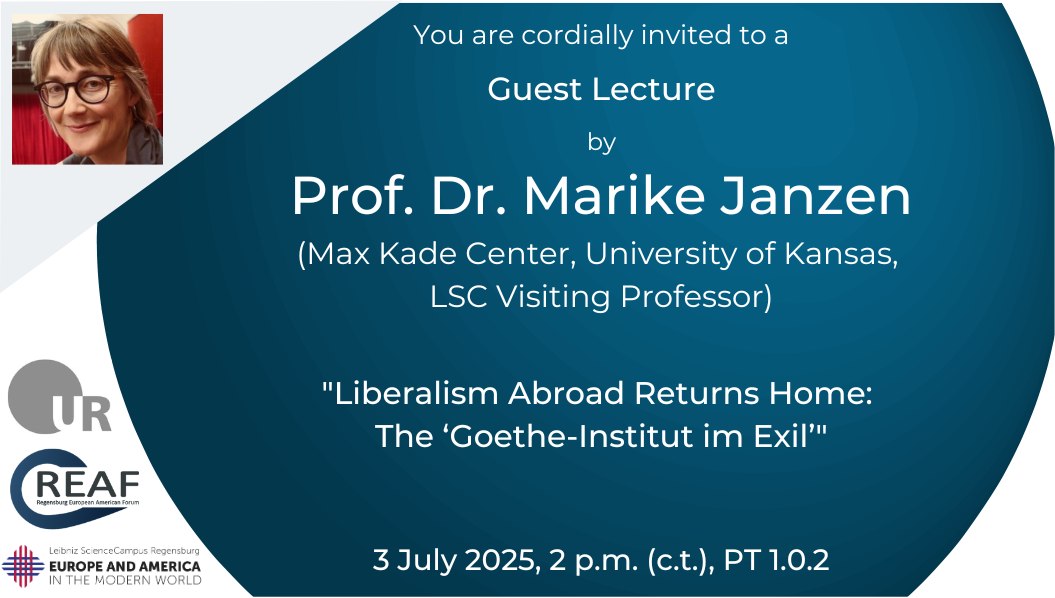Guest Lecture | Marike Janzen (Kansas) Liberalism Abroad Returns Home: The "Goethe-Institut im Exil"
When? Thu, 3 July, 14:00
Where? UR, Room PT 1.0.2
Current ScienceCampus visiting professor Marike Janzen (Max Kade Center, University of Kansas) will be giving a guest lecture at REAF exploring the Goethe Institute in exile.
All are welcome to attend this event at 14:00 on 3 July in Room PT 1.0.2.
Abstract: This talk examines the Goethe Institut im Exil, a Berlin-based program founded in 2023 in response to closures of Goethe Institutes in Syria, Afghanistan, Ukraine, and Belarus, countries where repressive regimes or on-the-ground violence prevented programming there to continue. In the words of an organizer, the Goethe Institut im Exil offers a platform for artists in German exile from “illiberal contexts,” to showcase their art to compatriots in exile in Germany and across Europe, as well as to a German audience. The “exile” in the program’s title refers both to the exiled people it serves, but also to the institute itself. Goethe Institutes are charged by the Federal Foreign Office to promote liberal autonomy and democratic citizenship via cultural exchange abroad: the Goethe Institut im Exil is unique for being situated in Germany—exiled on home soil—its mission turned to an exile population within Germany.
To sample what a program to promote liberalism abroad looks like when it returns home, I focus on a “Goethe Institut im Exil-Afghanistan” event held in June 2023. Significantly, the topics and interlocutors at the event were not assembled ex nihilo in Berlin—many featured both German and Afghan participants of Goethe Institute cultural initiatives carried out in Kabul and throughout Afghanistan between 2003 and 2021. Drawing on field observations, conversations with event organizers, as well as interviews and work published in German translation by the Berlin-based Afghan writer Taqi Akhlaqi, a participant at the “Goethe Institut im Exil-Afghanistan” event, I consider the following questions: In what ways did the event’s overarching concern with protecting the freedom of Afghans to create art, a legacy of the Goethe Institut’s work in Afghanistan, serve as a soft-power equivalent of a multi-national military intervention in the country, ostensibly to protect democracy? Is it more than the freedom to congregate in a crowded space and not fear that there will be a suicide bomber in one’s midst?[1] Can German promotion of “freedom” in Afghanistan and in German “exile” be separated from the consequences of NATO military intervention that has led people to flee Afghanistan? What is clear, is that the ubiquitous, but distinct, references to freedom and its relationship to art do not reflect a consensus, but are complicated and contextual.
Speaker's Bio:
Dr Marike Janzen is an Associate Professor in the Department of Slavic, German, and Eurasian Studies at the University of Kansas. She also serves as the Director of the Max Kade Center for German-American Studies. Her research focuses on 20th and 21st-century German literature, literature of human rights, migration and refugee experience, literary publics, and the literature of the international left, as well as broader questions in comparative and world literature. She holds a Ph.D. and M.A. in Comparative Literature from the University of Texas at Austin.

